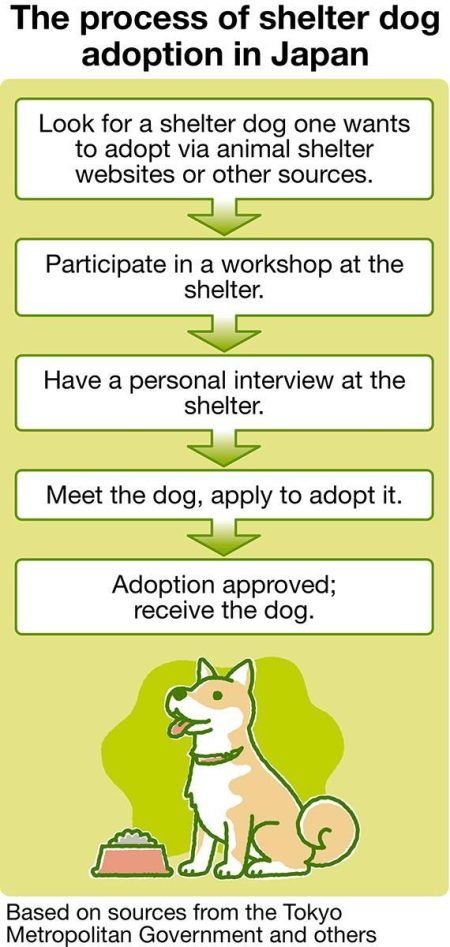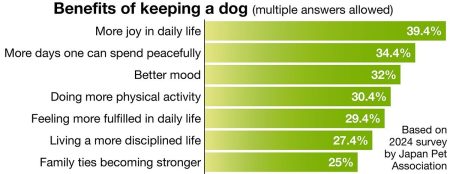October 7, 2025
TOKYO – After seeing their children leave the nest, or seperating from their partners, some people decide to adopt a shelter dog as a new family member. It seems they can relax and gain vitality through caring for and walking the dog every day.
“Since I got a dog, I’ve been feeling energized,” said company employee, 57, of Kanagawa Prefecture, as he stroked the head of his pet dog, Peko, with a smile on his face. He and his wife, 53, adopted the female dog, believed to be about 7 years old now, from Kanagawa Animal Welfare Center in October last year.
In the past several years, their parents and siblings died in succession. The couple’s daughter got a job and became independent in April this year. They decided to get a dog because they wanted something to shower with their love now that they would be living all alone and feeling lonely. They opted not to go to a pet shop. Rather, they chose a shelter dog because they wished to help a dog in need of a new family.
Workshop for preparation
The couple first attended a workshop organized by the animal protection center, at which they learned about the characteristics of shelter dogs and how to mentally prepare for caring for them, such as how to train such a dog and how they should be responsible for the animal until the end as its owners. Then they looked at the dogs registered with the center on its website, and Peko caught their eye. They applied to adopt the adorable dog with a toy-poodle-like appearance.
When the center’s staff interviewed them, they told the staff their ages and about their family structure as well as that they kept no other pets and that they lived in a detached house. When the couple met Peko, she immediately approached them.
“I heard that there’re many dogs that are cautious, but she didn’t look like that, and I liked that,” they said.
As for Peko’s age, he said, “A dog’s average lifespan is about 15 years. Since we were already past 50, we thought an older dog would suit us better than a puppy, taking into consideration how long we can take proper care of her.”
About a month and a half after the workshop, Peko came to the thier’ house, and their lives changed forever.
Every morning and early evening, the couple go for a walk with Peko for about 30 to 45 minutes.
“We started exercising again, and we now have more conversations between us as well as with our neighbors,” they said happily.
Peko is a little bit difficult to take care of. For example, she needs to be fed soft and easy-to-digest food. There is also a financial burden as they have to take her to get medical examinations at a family vet, among other things.
“Living with Peko is bliss. She enriches our lives,” she said with a smile.
Age and animal keeping

GRAPHICS: THE YOMIURI SHIMBUN
The Yomiuri Shimbun interviewed Kiyoshi Kurita, a veterinarian at the Tokyo Metropolitan Animal Care and Consultation Center, about how to adopt a shelter dog. Here is a summary of what he said.
Shelter dogs can be adopted at animal protection centers run by local governments, veterinary hospitals taking part in animal protection activities, private animal protection groups and so on. Of them, if you are thinking of choosing an animal protection group, the first thing you should do is to confirm whether the group is certified by the local government. The certification status of such a group can be found on the local government’s website. To avoid any trouble, you should also check whether the shelter dog you want to adopt has been vaccinated or not, and whether you have to pay for adoption, among other things. Also, check how the dog came to the shelter.
In general, you first look at websites and other places for a dog you would like to have, apply for the dog’s adoption and adopt the dog after going through several steps, including having an interview at the shelter and a “matchmaking” meeting with the dog. In some cases, an applicant’s wish is denied because the shelter believes that the person does not meet its requirements. For example, the Tokyo Metropolitan Government stipulates some conditions for those who apply to adopt shelter dogs in Tokyo.
The conditions include that they have to be age 60 or younger and that they keep no other pet dogs or cats. Some other municipalities require that an applicant be able to offer the adopted dog a sufficient living environment or that the applicant have enough time and money to care for a pet.
“Keeping a dog has a good effect on people, both physically and psychologically,” Kurita said. “Yet Japanese people’s healthy lifespan is said to be about 70 years. It is important that before adopting a dog, you should imagine how you and your family will be in 10 years or 15 years and think about whether you’ll be able to be with the dog when it dies.”
Increases exercise, happiness

GRAPHICS: THE YOMIURI SHIMBUN
In 2024, the Japan Pet Food Association asked 1,213 dog owners from their 20s to 70s with multiple answers allowed about the benefits of keeping a dog.
The answer chosen by the largest percentage of people, at 39.4%, was that their daily lives became more joyful, which was followed by the response that they saw an increase in the number of days they are able to spend peacefully, at 34.4%, and that their mood brightened up, at 32%. Looking at the responses by age, 30.1% of the respondents in their 50s said their family ties became tighter, and 39.4% of the respondents in their 70s said they saw an increase in their level of physical activity. Both percentages were particularly high among those age groups, respectively, compared to other age groups.
Furthermore, according to a survey this year of 581 women age 50 to 83 by think tank Harumeku Age Marketing Inc., those who keep pet animals, such as dogs and cats, have a higher happiness level than those who do not by 0.38 percentage points. Their average cost per month of keeping a pet was ¥20,603. As for negative things about keeping a pet, 55.1% cited that they cannot travel or go out for a long time, and 32.7% chose animals’ shedding hair.

